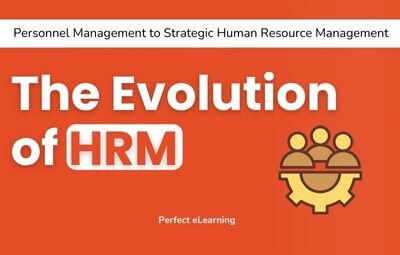

Explore the transformative journey of HRM, tracing its shift from basic personnel management to strategic HRM for organizational success.
Introduction
As businesses have evolved, so has the approach to managing their most vital asset: human capital. The evolution of HRM from its initial roots in Personnel Management has been marked by a paradigm shift towards a more strategic and holistic approach. Let's delve into this journey and understand its significance in the modern corporate world.
1.The Roots of Personnel Management
Personnel Management, the precursor to modern HRM, mainly focused on administrative tasks such as payroll, attendance, and compliance. It was primarily transactional and reactive in nature, emphasising maintaining workforce records and ensuring legal compliance.
2.Emergence of Human Resource Management (HRM)
The shift from Personnel Management to HRM marked a broader focus on the human element within organisations. HRM began to incorporate aspects like employee development, training, and motivation. The goal was to enhance employee satisfaction and productivity, recognizing that motivated employees contribute more effectively to the organisation's success.
3.The Paradigm Shift: Strategic Human Resource Management (SHRM)
The evolution didn't stop at HRM. It paved the way for SHRM, where HR functions became integral to an organisation's strategic planning. HR professionals started aligning their practices with the organisation's goals, becoming strategic partners in decision-making.
4.Aligning HRM with Organizational Goals
SHRM focuses on aligning HR practices with overarching business objectives. By understanding the company's strategic goals, HR professionals can tailor recruitment, training, and performance management strategies to drive desired outcomes.
5.From Reactive to Proactive: Anticipating HR Needs
In the era of SHRM, HR professionals anticipate future talent needs rather than simply reacting to current vacancies. This proactive approach ensures a consistent talent pipeline and minimizes disruptions due to workforce gaps.
6.Embracing Technology: HRM in the Digital Age
Technology has revolutionized SHRM, with tools like HRIS (Human Resource Information Systems) streamlining processes such as payroll, benefits administration, and performance evaluation. Automation allows HR professionals to focus more on strategic initiatives.
7.Developing Organizational Culture and Employee Engagement
SHRM places a strong emphasis on cultivating a positive organizational culture and fostering employee engagement. A supportive work environment enhances employee satisfaction, leading to higher retention rates and improved overall performance.
8.Nurturing Leadership and Talent Development
SHRM recognizes the importance of identifying and nurturing leadership potential within the organization. Leadership development programs empower employees to take on higher responsibilities, contributing to succession planning.
9.Diversity and Inclusion in SHRM
Diversity and inclusion have gained prominence in SHRM, recognizing the value of a diverse workforce. Inclusive practices promote innovation, enhance problem-solving, and create a harmonious work environment.
10.The Role of HR in Change Management
HR professionals play a pivotal role in managing organizational change. By effectively communicating changes, addressing employee concerns, and providing the necessary support, HR ensures a smoother transition.
11.Measuring HRM Impact on Organizational Success
SHRM emphasizes the importance of data-driven decisions. HR metrics and analytics help assess the impact of HR initiatives on business outcomes, enabling continuous improvement.
12.The Global Perspective of SHRM
In an interconnected world, SHRM extends beyond borders. Global organizations must navigate diverse cultures and legal frameworks while maintaining consistent HR practices.
13.Ethical Considerations in SHRM
With great power comes great responsibility. Ethical considerations are central to SHRM, ensuring fairness, respect, and transparency in all HR practices.
Conclusion
The evolution of HRM from Personnel Management to Strategic Human Resource Management represents a journey of transformation. It signifies a shift from administrative tasks to a strategic partnership, where HR plays a pivotal role in driving organizational success. This evolution continues as workplaces adapt to new challenges, technologies, and ways of working.
FAQs(Frequently Asked Questions)
Q1.What is the main difference between Personnel Management and Strategic Human Resource Management?
A1: The main difference lies in their focus and approach. Personnel Management is more administrative and reactive, while SHRM is strategic and proactive, aligning HR practices with business goals.
Q2.How does SHRM contribute to employee satisfaction?
A2: SHRM emphasizes creating a positive work environment, fostering engagement, and providing growth opportunities, which collectively enhance employee satisfaction.
Q3.Why is diversity important in SHRM?
A3: Diversity brings different perspectives and ideas, fostering innovation and creating a more inclusive workplace.
Q4.What role does technology play in SHRM?
A4: Technology automates administrative tasks, allowing HR professionals to focus on strategic initiatives like talent development and culture-building.
Q5.How does SHRM impact organizational culture?
A5:SHRM actively shapes organizational culture by promoting values, behaviors, and practices that align with the company's mission and vision.
Perfect eLearning is a tech-enabled education platform that provides IT courses with 100% Internship and Placement support. Perfect eLearning provides both Online classes and Offline classes only in Faridabad.
It provides a wide range of courses in areas such as Artificial Intelligence, Cloud Computing, Data Science, Digital Marketing, Full Stack Web Development, Block Chain, Data Analytics, and Mobile Application Development. Perfect eLearning, with its cutting-edge technology and expert instructors from Adobe, Microsoft, PWC, Google, Amazon, Flipkart, Nestle and Info edge is the perfect place to start your IT education.
Perfect eLearning provides the training and support you need to succeed in today's fast-paced and constantly evolving tech industry, whether you're just starting out or looking to expand your skill set.
There's something here for everyone. Perfect eLearning provides the best online courses as well as complete internship and placement assistance.
Keep Learning, Keep Growing.
If you are confused and need Guidance over choosing the right programming language or right career in the tech industry, you can schedule a free counselling session with Perfect eLearning experts.


